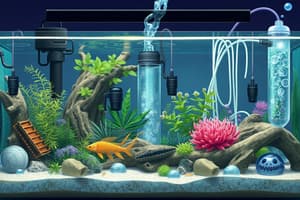Podcast
Questions and Answers
What is the primary purpose of aquarium filters?
What is the primary purpose of aquarium filters?
- To remove physical and soluble chemical waste products from the water in aquaria (correct)
- To provide oxygen to fish in the aquarium
- To increase the water temperature in aquaria
- To add nutrients to the water in aquaria
What is the largest cause of fish mortality in new, poorly maintained, or overloaded aquariums?
What is the largest cause of fish mortality in new, poorly maintained, or overloaded aquariums?
- Lack of oxygen in the water
- High water temperature
- Accumulation of toxic ammonia from decomposing wastes (correct)
- Excessive lighting
What is the purpose of mechanical filtration in aquariums?
What is the purpose of mechanical filtration in aquariums?
- To remove dissolved wastes from the water
- To increase the water temperature
- To add nutrients to the water
- To remove particulate material from the water column (correct)
What is the most popular material used for chemical filtration in aquariums?
What is the most popular material used for chemical filtration in aquariums?
Which type of aquarium filter is impeller powered and the most common?
Which type of aquarium filter is impeller powered and the most common?
What is the purpose of protein skimmers in marine-specific systems of filtration?
What is the purpose of protein skimmers in marine-specific systems of filtration?
What is the purpose of deep sand beds in marine-specific systems of filtration?
What is the purpose of deep sand beds in marine-specific systems of filtration?
What is the purpose of the Berlin method in managing water quality in aquariums?
What is the purpose of the Berlin method in managing water quality in aquariums?
What is the potential harm of undergravel filters on aquatic plants?
What is the potential harm of undergravel filters on aquatic plants?
Flashcards
Nitrogen Cycle in Aquariums
Nitrogen Cycle in Aquariums
A process where bacteria break down harmful ammonia into less toxic nitrates.
Mechanical Filtration
Mechanical Filtration
Particulate matter like uneaten food, fish waste, or plant debris is removed by this type of filtration.
Chemical Filtration
Chemical Filtration
This type of filtration removes dissolved wastes from the water, often using activated carbon or foam fractionation.
Power Filter
Power Filter
Signup and view all the flashcards
Canister Filter
Canister Filter
Signup and view all the flashcards
Undergravel Filter
Undergravel Filter
Signup and view all the flashcards
Algae Filters
Algae Filters
Signup and view all the flashcards
Protein Skimmers
Protein Skimmers
Signup and view all the flashcards
The Berlin Method
The Berlin Method
Signup and view all the flashcards
Study Notes
Aquarium Filters: A Critical Component of Maintaining Healthy Aquaria
-
Aquarium filters remove physical and soluble chemical waste products from the water in aquaria, simplifying maintenance and supporting life.
-
Proper management of the nitrogen cycle is vital to the health of an aquarium. Bacterial processes break down ammonia, which is highly toxic to fish, into nitrites and subsequently into the much less toxic nitrates.
-
Accumulation of toxic ammonia from decomposing wastes is the largest cause of fish mortality in new, poorly maintained, or overloaded aquariums.
-
Mechanical filtration removes particulate material from the water column. This particulate matter may include uneaten food, feces or plant or algal debris.
-
Dissolved wastes are more difficult to remove from the water. Chemical filtration is used for the removal of dissolved wastes, the most popular being the use of activated carbon and foam fractionation.
-
Numerous materials are suitable as aquarium filtration media. These include synthetic wools, synthetic sponges or foams, various ceramic and sintered glass and silicon products along with igneous gravels.
-
Power filters, canister filters, diatom filters, trickle filters, algae filters, baffle filters, fluidized bed filters, internal filters, and airlift filters are all types of aquarium filters commercially available.
-
Power filters are the most common type of aquarium filter and are impeller powered. They remove water from the aquarium, usually with a long siphoning tube, which is then pushed (or pulled) through a series of different filter media and returned to the aquarium.
-
Canister filters offer a greater quantity of filter materials to be used along with a greater degree of flexibility with respect to filter material choice.
-
Trickle filters, also known as wet/dry filters, are another water filtration systems for marine and freshwater aquariums.
-
Algae filters may be grown purposely, which removes chemicals from the water which need to be removed in order to have healthy fish, invertebrates, and corals.
-
Undergravel filters consist of a porous plate which is placed beneath the gravel on the base of the aquarium and one, or more, uplift tubes which are powered by an air pump.Undergravel Filters in Aquariums
-
Undergravel filters were historically driven via air displacement.
-
Air stones at the base of uplift tubes create negative pressure beneath the undergravel filter plate.
-
Water percolates down through the gravel bed that acts as the filtration material.
-
Water pump can be used to achieve a greater flow rate of water than air displacement.
-
Beneficial bacteria colonize the gravel bed and provide biological filtration.
-
Undergravel filters can be harmful to aquatic plants if the substrate bed is fine or uneven.
-
Fine substrates such as sand or peat may clog the undergravel filter.
-
In an uneven gravel bed, water will flow only through the thin portions of the bed, leaving the more heavily covered areas to become anoxic.
-
Protein skimmers, deep sand beds, and the Berlin method are marine-specific systems of filtration.
-
Protein skimmers remove organic compounds before they decompose into toxic substances.
-
Deep sand beds maintain high levels of anaerobic bacteria that remove nitrates and phosphates.
-
The Berlin method uses live rock, protein skimmers, and water changes to manage water quality.
Studying That Suits You
Use AI to generate personalized quizzes and flashcards to suit your learning preferences.





